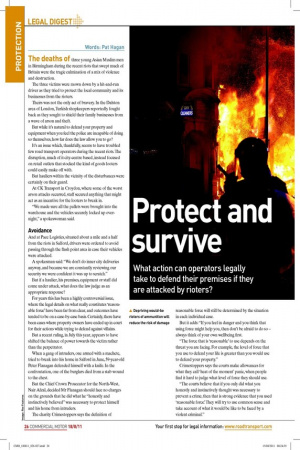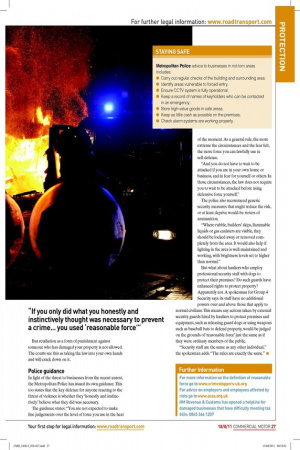Protect and survive
Page 22

Page 23

If you've noticed an error in this article please click here to report it so we can fix it.
What action can operators legally take to defend their premises if they are attacked by rioters?
Words: Pat Hagan The deaths of three young Asian Muslim men in Birmingham during the recent riots that swept much of Britain were the tragic culmination of a mix of violence and destruction.
The three victims were mown down by a hit-and-run driver as they tried to protect the local community and its businesses from the rioters.
Theirs was not the only act of bravery. In the Dalston area of London, Turkish shopkeepers reportedly fought back as they sought to shield their family businesses from a wave of arson and theft.
But while it’s natural to defend your property and equipment when you feel the police are incapable of doing so themselves, how far does the law allow you to go?
It’s an issue which, thankfully, seems to have troubled few road transport operators during the recent riots. The disruption, much of it city-centre based, instead focused on retail outlets that stocked the kind of goods looters could easily make off with.
But hauliers within the vicinity of the disturbances were certainly on their guard.
At CK Transport in Croydon, where some of the worst arson attacks occurred, staff secured anything that might act as an incentive for the looters to break in.
“We made sure all the pallets were brought into the warehouse and the vehicles securely locked up overnight,” a spokeswoman said.
Avoidance
And at Pace Logistics, situated about a mile and a half from the riots in Salford, drivers were ordered to avoid passing through the lash point area in case their vehicles were attacked.
A spokesman said: “We don’t do inner city deliveries anyway, and because we are constantly reviewing our security we were conident it was up to scratch.” But if a haulier, his premises, equipment or staff did come under attack, what does the law judge as an appropriate response?
For years this has been a highly controversial issue, where the legal details on what really constitutes ‘reasonable force’ have been far from clear, and outcomes have tended to be on a case-by-case basis. Certainly, there have been cases where property owners have ended up in court for their actions while trying to defend against villains.
But a recent ruling, in July this year, appears to have shifted the balance of power towards the victim rather than the perpetrator.
When a gang of intruders, one armed with a machete, tried to break into his home in Salford in June, 59-year-old Peter Flanagan defended himself with a knife. In the confrontation, one of the burglars died from a stab wound to the chest.
But the Chief Crown Prosecutor for the North-West, Nair Afzal, decided Mr Flanagan should face no charges on the grounds that he did what he “honestly and instinctively believed” was necessary to protect himself and his home from intruders.
The charity Crimestoppers says the deinition of reasonable force will still be determined by the situation in each individual case.
But it adds: “If you feel in danger and you think that using force might help you, then don’t be afraid to do so – always think of your own wellbeing irst.
“The force that is ‘reasonable’ to use depends on the threat you are facing. For example, the level of force that you use to defend your life is greater than you would use to defend your property.” Crimestoppers says the courts make allowances for what they call ‘heat of the moment’ panic, when people ind it hard to judge what level of force they should use.
“The courts believe that if you only did what you honestly and instinctively thought was necessary to prevent a crime, then that is strong evidence that you used ‘reasonable force’. They will try to use common sense and take account of what it would be like to be faced by a violent criminal.” But retaliation as a form of punishment against someone who has damaged your property is not allowed. The courts see this as taking the law into your own hands and will crack down on it.
Police guidance
In light of the threat to businesses from the recent unrest, the Metropolitan Police has issued its own guidance. This too states that the key defence for anyone reacting to the threat of violence is whether they ‘honestly and instinctively’ believe what they did was necessary.
The guidance states: “You are not expected to make ine judgements over the level of force you use in the heat of the moment. As a general rule, the more extreme the circumstances and the fear felt, the more force you can lawfully use in self-defence.
“And you do not have to wait to be attacked if you are in your own home or business, and in fear for yourself or others. In those circumstances, the law does not require you to wait to be attacked before using defensive force yourself.” The police also recommend generic security measures that might reduce the risk, or at least deprive would-be rioters of ammunition.
“Where rubble, builders’ skips, lammable liquids or gas canisters are visible, they should be locked away or removed completely from the area. It would also help if lighting in the area is well-maintained and working, with brightness levels set to higher than normal.” But what about hauliers who employ professional security staff with dogs to protect their premises? Do such guards have enhanced rights to protect property? Apparently not. A spokesman for Group 4 Security says its staff have no additional powers over and above those that apply to normal civilians. This means any actions taken by external security guards hired by hauliers to protect premises and equipment, such as releasing guard dogs or using weapons such as baseball bats to defend property, would be judged on the grounds of ‘reasonable force’ just the same as if they were ordinary members of the public.
“Security staff are the same as any other individual,” the spokesman adds. “The rules are exactly the same.” ■

















































